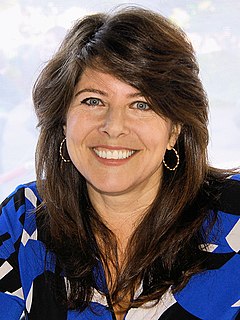
Naomi Rebekah Wolf is an American feminist author and journalist.
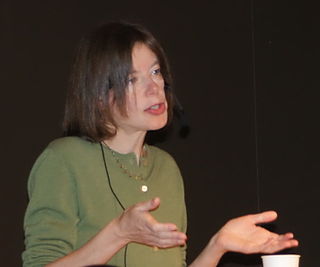
Susan Charlotte Faludi is an American feminist, journalist, and author. She won a Pulitzer Prize for Explanatory Journalism in 1991, for a report on the leveraged buyout of Safeway Stores, Inc., a report that the Pulitzer Prize committee commended for depicting the "human costs of high finance". She was also awarded the Kirkus Prize in 2016 for In the Darkroom, which was also a finalist for the 2017 Pulitzer Prize in biography.

The damsel in distress is a recurring narrative device in which one or more men must rescue a woman who has either been kidnapped or placed in general peril. Kinship, love, or lust gives the male protagonist the motivation or compulsion to initiate the narrative. The female character herself may be competent, but still finds herself in this type of situation. The helplessness of these fictional females, according to some critics, is linked to views outside of fiction that women as a group need to be taken care of by men. The evolution of the trope throughout history has been described as such: "What changes through the decades isn’t the damsel – it’s the attacker. The faces of the attacker in popular media are legion: monsters, mad scientists, Nazis, hippies, bikers, aliens... whichever group best meets the collective fears of a culture gets the role". This trope does not necessarily involve the male protagonist "getting" the female as a reward, but may be combined with other tropes where the female character becomes the male character's reward at the end of the story.

Katie Roiphe is an American author and journalist. She is best known as the author of the non-fiction examination The Morning After: Fear, Sex and Feminism (1994). She is also the author of Last Night in Paradise: Sex and Morals at the Century's End (1997), and the 2007 study of writers and marriage, Uncommon Arrangements. Her 2001 novel Still She Haunts Me is an imagining of the relationship between Charles Dodgson and Alice Liddell, the real-life model for Dodgson's Alice's Adventures in Wonderland. She is also known for allegedly planning to out the creator of the Shitty Media Men list in an article for Harper's magazine.
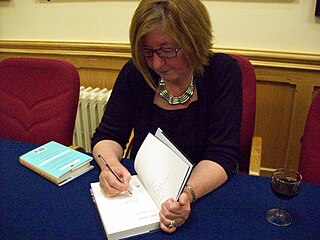
Patricia Mary W. Barker, is an English writer and novelist. She has won many awards for her fiction, which centres on themes of memory, trauma, survival and recovery. Her work is described as direct, blunt and plainspoken. In 2012, The Observer named the Regeneration Trilogy as one of "The 10 best historical novels".
The term postfeminism is used to describe reactions against contradictions and absences in feminism, especially second-wave feminism and third-wave feminism. The term postfeminism is sometimes confused with subsequent feminisms such as fourth-wave feminism and xenofeminism.
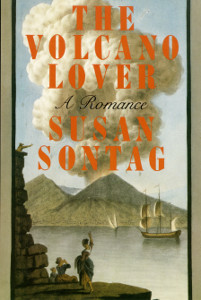
The Volcano Lover is an historical novel by Susan Sontag, published in 1992. Set largely in Naples, it focuses upon Emma Hamilton, her marriage to Sir William Hamilton, the scandal relating to her affair with Lord Nelson, her abandonment, and her descent into poverty. The title comes from William Hamilton's interest in volcanoes, and his investigations of Mount Vesuvius.

Michiko Kakutani is an American literary critic and former chief book critic for The New York Times. Her awards include a Pulitzer Prize for Criticism.
Yoshiko Uchida was a Japanese American writer.

In the Beauty of the Lilies is a 1996 novel by John Updike. It takes its title from a line of the abolitionist song "The Battle Hymn of the Republic." The novel received the 1997 Ambassador Book Award for Fiction.
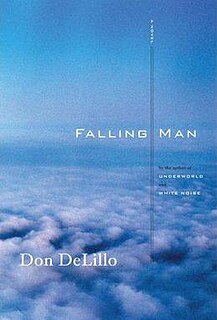
Falling Man is a novel by Don DeLillo, published May 15, 2007. An excerpt from the novel appeared in short story form as "Still Life" in the April 9, 2007, issue of The New Yorker magazine.

Backlash: The Undeclared War Against American Women is a 1991 book by Susan Faludi, in which the author presents evidence demonstrating the existence of a media-driven "backlash" against the feminist advances of the 1970s in the United States.

Camille Anna Paglia is an American feminist academic and social critic. Paglia has been a professor at the University of the Arts in Philadelphia, Pennsylvania, since 1984. She is critical of many aspects of modern culture and is the author of Sexual Personae: Art and Decadence from Nefertiti to Emily Dickinson (1990) and other books. She is also a critic of contemporary American feminism and of post-structuralism, as well as a commentator on multiple aspects of American culture such as its visual art, music, and film history.

CivilWarLand in Bad Decline is a book of short stories and a novella by the American writer George Saunders. Published in 1996, it was Saunders's first book. Many of the stories initially appeared in different forms in various magazines, including Kenyon Review, Harper's, The New Yorker and Quarterly West. The collection was listed as a Notable Book of 1996 by The New York Times, as well as a finalist for the 1996 PEN/Hemingway Award.
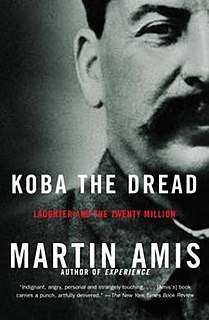
Koba the Dread: Laughter and the Twenty Million is a 2002 non-fiction book by British writer Martin Amis.

Madonna: Like an Icon is a biography by English author Lucy O'Brien, chronicling the life of American singer Madonna. The book was released on 27 August 2007, by Bantam Press in the United Kingdom, and on 18 October 2007, by Harper Collins in the United States. Madonna: Like an Icon chronicles the life of the singer from her birth, up to the release of her eleventh studio album, Hard Candy, in 2008. Initially critical of her work, O'Brien had become a fan of Madonna after seeing her perform on television for The Virgin Tour in 1985. From that point of time, the author followed Madonna's career closely, attending her concerts, and collecting interviews, magazines, and albums.

Who Stole Feminism? How Women Have Betrayed Women is a 1994 book about American feminism by Christina Hoff Sommers, a writer who was at that time a philosophy professor at Clark University. Sommers argues that there is a split between equity feminism and what she terms "gender feminism". Sommers contends that equity feminists seek equal legal rights for women and men, while gender feminists seek to counteract historical inequalities based on gender. Sommers argues that gender feminists have made false claims about issues such as anorexia and domestic battery and exerted a harmful influence on American college campuses. Who Stole Feminism? received wide attention for its attack on American feminism, and it was given highly polarized reviews divided between conservative and liberal commentators. Some reviewers praised the book, while others found it flawed.

Susan J. Douglas is an American feminist columnist, and cultural critic who writes about gender issues, media criticism and American politics. She has published five books on American history, and is currently Catherine Neafie Kellogg Professor of communication studies at the University of Michigan at Ann Arbor.
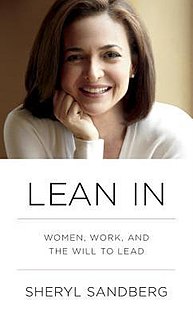
Lean In: Women, Work, and the Will to Lead is a 2013 book encouraging women to assert themselves at work and at home, co-written by Facebook's chief operating officer Sheryl Sandberg and TV and magazine writer Nell Scovell.
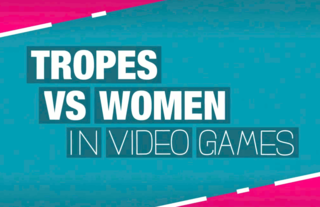
Tropes vs. Women in Video Games is a YouTube video series created by Anita Sarkeesian examining gender tropes in video games. The series was financed via crowdfunding, and came to widespread attention when its Kickstarter campaign triggered a wave of sexist harassment against Sarkeesian. Released on the channel FeministFrequency between March 2013 and April 2017, the series consists of eighteen episodes.


















